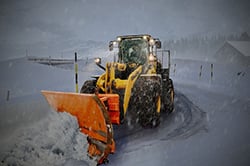 Across the country, temperatures plummet during cold winter months. Many employees must work outdoors and face injury or even death because of the weather conditions. Protect your outdoor workers with several safety precautions.
Across the country, temperatures plummet during cold winter months. Many employees must work outdoors and face injury or even death because of the weather conditions. Protect your outdoor workers with several safety precautions.
Which Employees are at Risk?
Employees who work outdoors for extended periods could suffer weather-related injuries. These employees include:
- Police officers, firefighters, EMTs
- Snow cleanup crews
- Utility workers
- Construction crews
- Postal workers
- Miners
- Farmers
- Traffic controllers
Employees who only spend a short time outside could also be in harm’s way, though, if they don’t prepare properly for the conditions.
Understand Winter Weather Dangers
Cold air temperatures, high winds, damp air, slippery surfaces and contact with water threaten your outdoor employees. Winter weather dangers also include frostbite, hypothermia, increased strain and injury risks, dehydration, decreased performance and other health and safety challenges.
Tips to Protect Your Outdoor Employees
Assess the dangers your outdoor employees face, and then implement safety protocols that protect your team.
Know the forecast.
If the forecast calls for cold temperatures, high winds, snow or ice, alert employees. Ensure they take appropriate safety measures.
Wear protective clothing.
Clothing provides employees with a defense against winter weather. To stay warm, ask your employees to follow these clothing tips.
- Wear three layers. An inner insulating layer traps perspiration, a middle layer protects the body from precipitation and an outer layer allows ventilation and prevents overheating.
- Fabric matters. Wool, silk or certain synthetic fabric, rather than cotton, keeps skin dry even in wet weather or when perspiring.
- Loose is better. Tight clothing can trap moisture and lower body temperature.
- Remember the extremities. A hat, gloves, two pairs of socks and insulated shoes protect head, hands and feet.
- Pack extra clothing. If an accident happens, your employees can change clothes and get dry and warm.
Stay alert to body changes.
Ask your employees to look for symptoms of frostbite, hypothermia, dehydration or other problems. They should report tingling, itching, burning, pain, sluggishness, aggressive shivering, disorientation and slurred speech to their supervisor.
Eat a healthy diet.
The right diet fuels employees and helps them stay safe and alert. Adequate fluids prevent dehydration, and a balanced diet improves focus and energy. Employees should avoid alcohol and tobacco as these substances can impair thinking, constrict blood vessels and restrict blood flow, which increases heat loss and affects the body’s ability to warm extremities.
Apply sunscreen.
Harmful UVA and UVB rays can cause sunburn in any weather. Provide sunscreen for all employees to wear on exposed skin.
Promote safety this winter for your outdoor employees when you follow these tips. For more information on outdoor work safety, access OSHA’s winter weather resources.





